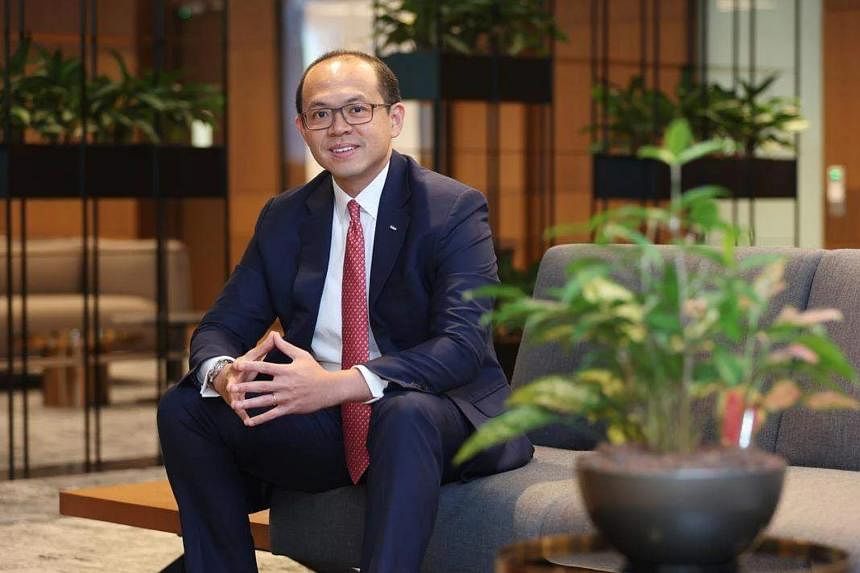SINGAPORE - Keppel Infrastructure Trust (KIT) has expanded its portfolio under the watch of Mr Jopy Chiang, who assumed the role of chief executive at KIT's trustee-manager just over a year ago.
The trust has secured interests in a pipeline of wind assets in Europe, on top of venturing into Saudi Arabia and South Korea - broadening its reach outside its existing markets of Singapore, Australia, New Zealand and the Philippines.
It is also reshaping its strategy to ensure it can take advantage of new opportunities. In April, the trust reorganised its portfolio into three key business segments: energy transition, environmental services, and distribution and storage.
"KIT is transforming as a portfolio," said Mr Chiang. "We see a lot of strong momentum and opportunity in the decarbonisation megatrend globally... There was a repositioning of the trust to capitalise on a lot of the opportunities, and also to continue to grow on a new foundational footing."
In July, KIT marked its first move into the renewable energy sector and maiden acquisition in Europe with a proposal to invest in wind farms alongside Keppel Corp. The two companies have formed a joint venture to invest €160 million (S$225 million) in Wind Fund I. The latter will, in turn, co-invest in a diversified portfolio of wind projects across Norway, Sweden and Britain. KIT's investment will come to €131.2 million.
This was followed in August by another joint investment to take a stake in a German offshore wind farm. KIT will pay €250.1 million for an effective stake of 20.5 per cent in the project.
Also in August, KIT announced its participation in a Keppel consortium to buy South Korean waste management company Eco Management Korea Holdings. The consideration for the deal is estimated at 626.1 billion won (S$624.5 million), of which KIT's share is 325.6 billion won.
With these three deals, Mr Chiang said KIT's assets under management (AUM) would rise 36 per cent to $6.1 billion. He aims to grow the trust's portfolio to $18 billion within the next decade. Renewable energy investments are expected to make up 25 per cent of its "equity-adjusted AUM", up from the current 10 per cent.
Keeping house
Mr Chiang's appointment has coincided with KIT's first increase in its full-year distribution per unit (DPU) since financial year (FY) 2016. For FY2021, KIT paid out 3.78 cents per unit - up from 3.72 cents in FY2020.
The trust also reported a 2.7 per cent year-on-year increase in its DPU for the first half of FY2022, despite a lower distributable income. This was due to "higher finance costs related to the issuance of new capital in the form of debt securities", Mr Chiang said.
He added that KIT is "quite comfortable" maintaining its growth in distributions, pointing to a US$250 million (S$359 million) investment in Aramco Gas Pipelines Company in February that will contribute to income over the course of this year.
It has taken Mr Chiang a "fair bit" of housekeeping to get here. In particular, KIT put its embattled Australian subsea cable subsidiary Basslink under voluntary administration in November 2021.
What lessons have been learnt? "With infrastructure, you cannot ignore the regulatory and political risks for investee companies," he said. "It behoves us as a manager to have boots on the ground, to have really strong oversight of our portfolio companies."
The move has also freed up management bandwidth to focus on growing KIT's portfolio by leveraging the Keppel ecosystem, which Mr Chiang said gives the trust an ability to secure investments in "very attractive areas" and invest alongside players that are "multiple times larger".
As an example, Mr Chiang points to the commercial ties that led to KIT's investment in Wind Fund I. The fund will invest in projects sponsored by Norwegian power producer Fred. Olsen Renewables - a customer of Keppel's offshore and marine arm.
KIT also intends to acquire from its sponsor Keppel Infrastructure Holdings a 50 per cent stake in the Keppel Marina East Desalination Plant.
"With all these recent acquisitions, we have demonstrated that we are working with different pockets of capital; that is, we are working either with the parent company Keppel Corp, or we are working with another pool of capital within Keppel Capital," he said.
Rising yield
In spite of Mr Chiang's efforts, however, units of KIT have fallen 1.8 per cent over the past year. They closed at 54 cents on Friday, giving the trust a historical yield of 7 per cent, based on the FY2022 DPU.
KIT's high yield makes it challenging to acquire new assets that are both DPU- and yield-accretive.
Mr Chiang, however, said KIT has shown "rigour and discipline in really sieving out and identifying the best returning investments that fit within the portfolio", and added that the trust has "raised about a billion of dry powder in a low interest rate environment, at a cost of about 3 per cent to 4.75 per cent".
Mr Chiang is optimistic of growing KIT's asset base in new sectors amid the challenging macro environment.
The digital infrastructure space, for one thing, is an "exciting sector that will benefit from the theme of decentralised energy management", he said. The trust is currently looking at a smart metering opportunity in Australia and New Zealand.
"We will very carefully navigate and tread in the many months to come," Mr Chiang added. "But we see very compelling buying opportunities in this mix of uncertainty, and that is where we would like to focus our investment activities." THE BUSINESS TIMES

